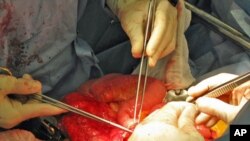Organ transplant recipients have a much greater risk of cancer than the general population, according to a new study, but the reason is not entirely clear.
Cancer growth is often triggered by viruses, and the body’s immune system helps keep those viruses in check. But transplant recipients get powerful drugs to suppress their immune system, so that they don't reject the transplanted organ.
Researchers have known that transplant recipients are more likely to get cancer, but this new study, published in JAMA, shows how much more likely.
Lead author Eric Engles, of the U.S. National Cancer Institute, says getting an organ transplant can double your risk of cancer during the year after transplant.
“So, if a population like ours would be expected to develop about seven cancers in 1,000 people, we observed about twice that - about 13 or 14 cancers among 1,000 people [who got transplants] followed for one year.”
Engles and his colleagues used records of 175,000 U.S. transplant patients. Kidney transplants were the most common, followed by liver, heart and lung.
The cancers sometimes showed up in the transplanted organ. Kidney cancer was most common in kidney recipients. Likewise, lung cancer among lung recipients.
But other cancers didn't have a direct link with the organ that was transplanted. For example, the most common cancer among transplant recipients is non-Hodgkin lymphoma, which affects the immune system.
“And this is seen in immuno-compromised people, and it's due to a virus, Epstein-Barr virus," Engles says. "And we saw a very elevated risk for this cancer, particularly among lung recipients, and we think that that high risk might relate in part to the fact that those people receive especially intense immune suppression.”
Even though transplant patients may face a doubled risk of cancer, Engles says it must be put into the context of other transplant risks - including organ rejection and infection - and the procedure’s benefits.
“Transplantation is a life-saving therapy and is one of the miracles of modern medicine. Cancer is one of the important complications of transplantation, but it's not the only one.”




